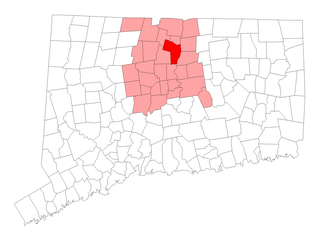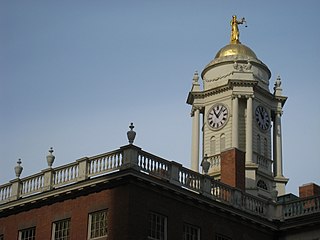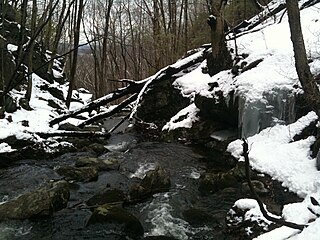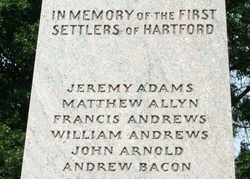| Richard Risley | |
|---|---|
| Personal details | |
| Born | prior to 1615 |
| Died | October 1648 Hartford, Connecticut, United States |
| Spouse(s) | Mary Arnold |
Richard Risley (before 1615 – October 1648) was an early Puritan settler in the Massachusetts Bay Colony and one of the founders of Hartford, Connecticut. [1] Risley sailed from England on July 15, 1633, in the ship Griffen with Thomas Hooker, William Stone, John Cotton, and John Haynes. [2] They arrived in Boston on September 4, 1633.

The Massachusetts Bay Colony (1628–1691) was an English settlement on the east coast of North America in the 17th century around the Massachusetts Bay, the northernmost of the several colonies later reorganized as the Province of Massachusetts Bay. The lands of the settlement were located in southern New England in Massachusetts, with initial settlements situated on two natural harbors and surrounding land, about 15.4 miles (24.8 km) apart—the areas around Salem and Boston.
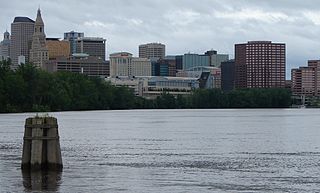
Hartford is the capital city of Connecticut. It was the seat of Hartford County until Connecticut disbanded county government in 1960. The city is nicknamed the "Insurance Capital of the World", as it hosts many insurance company headquarters and is the region's major industry. It is the core city in the Greater Hartford area of Connecticut. Census estimates since the 2010 United States Census have indicated that Hartford is the fourth-largest city in Connecticut, behind the coastal cities of Bridgeport, New Haven, and Stamford.

Thomas Hooker was a prominent Puritan colonial leader, who founded the Colony of Connecticut after dissenting with Puritan leaders in Massachusetts. He was known as an outstanding speaker and an advocate of universal Christian suffrage.
In May 1636, Risley left Massachusetts with almost the entire company he had arrived with two and a half years earlier. They found John Winthrop to be too dictatorial. The group headed west through the wilderness, and after a month stopped in an area now occupied by the city of Hartford, Connecticut.

John Winthrop was an English Puritan lawyer and one of the leading figures in founding the Massachusetts Bay Colony, the second major settlement in New England, following Plymouth Colony. Winthrop led the first large wave of immigrants from England in 1630 and served as governor for 12 of the colony's first 20 years. His writings and vision of the colony as a Puritan "city upon a hill" dominated New England colonial development, influencing the governments and religions of neighboring colonies.
Within the year, the group started a collective government to fight the Pequot War. By the next year, they had adopted what is now generally considered the first written constitution in Western history, the Fundamental Orders of Connecticut. The group eventually signed a treaty with the Indians for a tract of land and settled down.

The Pequot War was an armed conflict that took place between 1636 and 1638 in New England between the Pequot tribe and an alliance of the colonists of the Massachusetts Bay, Plymouth, and Saybrook colonies and their allies from the Narragansett and Mohegan tribes. The war concluded with the decisive defeat of the Pequots. At the end, about 700 Pequots had been killed or taken into captivity. Hundreds of prisoners were sold into slavery to the West Indies; other survivors were dispersed as captives to the victorious tribes.

Western culture, sometimes equated with Western civilization, Occidental culture, the Western world, Western society, and European civilization, is a term used very broadly to refer to a heritage of social norms, ethical values, traditional customs, belief systems, political systems and specific artifacts and technologies that have some origin or association with Europe. The term also applies beyond Europe to countries and cultures whose histories are strongly connected to Europe by immigration, colonization, or influence. For example, Western culture includes countries in the Americas and Australasia, whose language and demographic ethnicity majorities are European. The development of western culture has been strongly influenced by Christianity.

The Fundamental Orders were adopted by the Connecticut Colony council on January 14, 1639 OS. The fundamental orders describe the government set up by the Connecticut River towns, setting its structure and powers. They wanted the government to have access to the open ocean for trading.
The present-day state capitol building in Hartford sits on the original Risley land grant. [3]
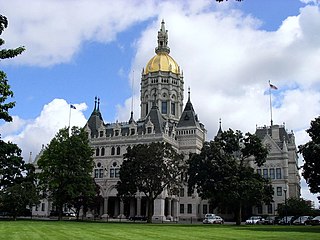
The Connecticut State Capitol is located north of Capitol Avenue and south of Bushnell Park in Hartford, the capital of Connecticut. The building houses the Connecticut General Assembly; the upper house, the State Senate, and lower house, the House of Representatives, as well as the office of the Governor of the State of Connecticut. The Connecticut Supreme Court sits across Capitol Avenue in a different building.
A land grant is a grant of land – held by a government to hold until the land it granted to a person. The United States historically gave out numerous land grants to people desiring farmland. The American Industrial Revolution was guided by many supportive acts of legislatures promoting commerce or transportation infrastructure development by private companies, such as the Cumberland Road turnpike, the Lehigh Canal, the Schuylkill Canal, and the many railroads that tied the young United States together.
Risley died at Hockanum, Connecticut of typhoid in October 1648, leaving his wife and three children, ages two months to eight years.

Hockanum is a neighborhood in southwest East Hartford, Connecticut. The area is named after the Hockanum River, and has an elementary school of the same name. Although many beautiful colonial homes exist in the area, the neighborhood has deteriorated in recent years due to extensive housing projects.
